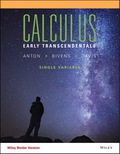
A vector w is a linear combination of the
(a) Find scalars
(b) Show that the vector
Want to see the full answer?
Check out a sample textbook solution
Chapter 11 Solutions
EBK CALCULUS EARLY TRANSCENDENTALS SING
Additional Math Textbook Solutions
Probability And Statistical Inference (10th Edition)
Intro Stats, Books a la Carte Edition (5th Edition)
A First Course in Probability (10th Edition)
Using and Understanding Mathematics: A Quantitative Reasoning Approach (6th Edition)
University Calculus: Early Transcendentals (4th Edition)
Calculus: Early Transcendentals (2nd Edition)
- Solve y"+4y = 0, y y(t) = 4arrow_forwardPerform long division on the integrand, write the proper fraction as a sum of partial fractions, and then evaluate the integral. 30x³-60x²+8 dx 2 x-2x After performing the long division, write the resulting proper fraction as a sum of partial fractions. Evaluate the integral. 30x³-60x²+8 2 x² -2x dx=arrow_forwardEvaluate the following integral. x/6 S tan 2x dx x/12arrow_forward
- Evaluate the integral by using a substitution prior to integration by parts. 7) sin (In (6x)) dxarrow_forwardEvaluate the integral using any appropriate algebraic method or trigonometric identity. S- dy 18 √2 (1+y2/3) yarrow_forward4. Suppose the demand for a certain item is given by D(p)=-2 p² - 4p+350, where p represents the price of the item in dollars. a) Find the rate of change of demand with respect to price. b) Find and interpret the rate of change of demand when the price is $11.arrow_forward
- √3-x, x≤3, 2. For f(x) = 1 find each of the following. x > 3, x-3' 1. f(-6) 2. f(3) 3. f(7) 3. Find the domain of each of the following functions.arrow_forward1. Using the definition of the derivative, find f'(x). Then find f'(2), f'(0) and f'(3) when the derivative exists. a) f(x)=5x²-6x-1arrow_forward2. f(x)=√7-x 4. A manufacturer has a monthly fixed cost of $40,000 and a production cost of $8 for each unit produced. The product sells for $12 per unit. 1. What is the cost function? 2. What is the revenue function? 3. Compute the profit corresponding to 12,000 units. 5. A rectangular box is to have a square base and a volume of 20 ft3. The material for the base costs $0.30 per ft2, the material for the sides cost $0.10 per ft2, and the material for the top costs $0.20 per ft2. Letting x denote the length of one side of the base,arrow_forward
- Solve using superposition principlearrow_forwardreview problems please help!arrow_forward3. f(7) 3. Find the domain of each of the following functions. 1 1. f(x)=2-6x+8 2. f(x)=√√7-x 4. A manufacturer has a monthly fixed cost of $40,000 and a production cost of $8 for each unit produced. The product sells for $12 per unit.arrow_forward
- Algebra & Trigonometry with Analytic GeometryAlgebraISBN:9781133382119Author:SwokowskiPublisher:Cengage
 Elementary Linear Algebra (MindTap Course List)AlgebraISBN:9781305658004Author:Ron LarsonPublisher:Cengage Learning
Elementary Linear Algebra (MindTap Course List)AlgebraISBN:9781305658004Author:Ron LarsonPublisher:Cengage Learning Linear Algebra: A Modern IntroductionAlgebraISBN:9781285463247Author:David PoolePublisher:Cengage Learning
Linear Algebra: A Modern IntroductionAlgebraISBN:9781285463247Author:David PoolePublisher:Cengage Learning  Trigonometry (MindTap Course List)TrigonometryISBN:9781337278461Author:Ron LarsonPublisher:Cengage Learning
Trigonometry (MindTap Course List)TrigonometryISBN:9781337278461Author:Ron LarsonPublisher:Cengage Learning



